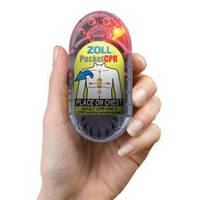Microelectromechanical Systems (MEMS)
Pocket-Sized CPR Rescue Device Enabled by Analog Devices' MEMS Motion Sensing Technology

o Affordably Priced PocketCPR from ZOLL Medical Corporation Uses ADI's iMEMS Accelerometer to Measure Chest Compressions and Aid Rescuers
NORWOOD, Mass. -- Analog Devices, Inc. (NYSE: ADI) today announced that ZOLL Medical Corporation (Nasdaq GS: ZOLL) has selected ADI's high performance iMEMS® technology to enable its palm-sized CPR (cardiopulmonary resuscitation) device that measures the rate and depth of chest compressions administered by rescuers. The PocketCPR® device uses an ADI digital iMEMS accelerometer to convert the motion of PocketCPR into real-time measurement data to accurately read the rate and depth of CPR chest compressions. This helps rescuers achieve the right amount of force and frequency of chest compressions recommended by the American Heart Association (AHA). Watch an ADI/PocketCPR video.
PocketCPR coaches a rescuer with audio and visual instructions to initiate the critical rescue steps needed for reviving someone experiencing sudden cardiac arrest. These steps include checking responsiveness, calling for help, and performing CPR. All steps follow the AHA Chain of Survival.
"By working with engineers at Analog Devices, we were able to turn our vision of developing a small, affordable CPR rescue device into reality," says Mark Totman, president of Bio-Detek, Inc., a wholly owned subsidiary of ZOLL that developed and manufactures the PocketCPR.
"Many people are reluctant to perform CPR because they are not trained to do so or lack the confidence to perform this life-saving rescue procedure. PocketCPR gives them the assurance they need to perform CPR in an emergency," continued Totman.
Approved by the FDA (U.S. Food and Drug Administration) as an over-the-counter rescue device and affordably priced at $149.00, PocketCPR provides the user with prompts to encourage a compression depth of 1.5 to 2 inches as recommended by the AHA and International Liaison Committee on Resuscitation (ILCOR). The device instructs the rescuer to "push harder" if the compressions are less than 1.5 inches. If good compressions are delivered, PocketCPR will respond with "good compressions." A metronome helps the user achieve the proper rate of compression. For more information on PocketCPR, visit www.pocketcpr.com.
"According to the Sudden Cardiac Arrest Association, more than 300,000 people in the United States suffer from sudden cardiac arrest each year," said Patrick O'Doherty, vice president, Healthcare Group, Analog Devices. "The American Heart Association estimates that for each minute that goes by without the heart being restored to a normal rhythm, the survival rate of an individual experiencing sudden cardiac arrest drops by up to 10 percent. PocketCPR helps save lives by ensuring rescuers administer CPR of how ADI's products and technologies are enabling revolutionary healthcare designs and shaping future advances in medical equipment."
ZOLL Medical Corporation develops and markets medical devices and software solutions that help advance emergency care and save lives, while increasing clinical and operational efficiencies. With products for defibrillation and monitoring, circulation and CPR feedback, data management, fluid resuscitation, and therapeutic temperature management, ZOLL provides a comprehensive set of technologies which help clinicians, EMS and fire professionals, and lay rescuers treat victims needing resuscitation and critical care.
ADI Technology in the PocketCPR Rescue Device
PocketCPR uses Analog Devices' ADXL322 iMEMS low g high-performance accelerometer with signal-conditioned voltage outputs. Operating on power supplies as low as 2.7 VDC, the accelerometer typically consumes only 340 micro amps, and can be power-cycled for even greater battery life. The typical noise floor is less than 220 micro g per root hertz, allowing small tilt changes to be sensed using the narrow bandwidths (<10 Hz) typical of human motion. Selectable bandwidths of 0.5 Hz to 2.5 kHz allow additional flexibility to suit the application. Other products in ADI's digital iMEMS accelerometer portfolio include the ADXL345, ADXL327, and ADXL325. Read the ADI/PocketCPR case study.
Making a Difference for Healthcare Customers
Analog Devices offers healthcare customers a comprehensive portfolio of linear, mixed-signal, MEMS and digital signal processing technologies for medical imaging, patient monitoring, medical instrumentation, and consumer/home healthcare. Backed by leading design tools, applications support, and systems expertise, ADI's products and technologies enable differentiation in healthcare designs - helping shape the future of diagnostics and monitoring equipment, as well as health and wellness devices. ADI's healthcare offerings can be found at www.analog.com/healthcare.
About Analog Devices
Innovation, performance, and excellence are the cultural pillars on which Analog Devices has built one of the longest standing, highest growth companies within the technology sector. Acknowledged industry-wide as the world leader in data conversion and signal conditioning technology, Analog Devices serves over 60,000 customers, representing virtually all types of electronic equipment. Celebrating over 40 years as a leading global manufacturer of high-performance integrated circuits used in analog and digital signal processing applications, Analog Devices is headquartered in Norwood, Massachusetts, with design and manufacturing facilities throughout the world. Analog Devices' common stock is listed on the New York Stock Exchange under the ticker "ADI" and is included in the S&P 500 Index. www.analog.com
Source: Analog Devices, Inc.
Contacts:
Analog Devices, Inc.
Linda Kincaid, 781-461-3337
linda.kincaid@analog.com




